 Petzlover
Petzlover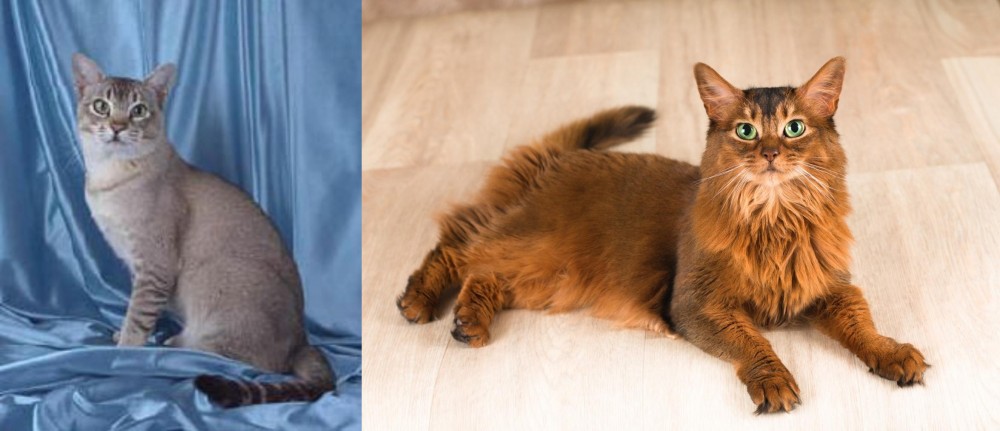 Both American Keuda and Somali are originated from United States. Both American Keuda and Somali are having almost same weight. Both American Keuda and Somali has same life span. Both American Keuda and Somali has same litter size. American Keuda requires Low Maintenance. But Somali requires Moderate Maintenance
Both American Keuda and Somali are originated from United States. Both American Keuda and Somali are having almost same weight. Both American Keuda and Somali has same life span. Both American Keuda and Somali has same litter size. American Keuda requires Low Maintenance. But Somali requires Moderate Maintenance
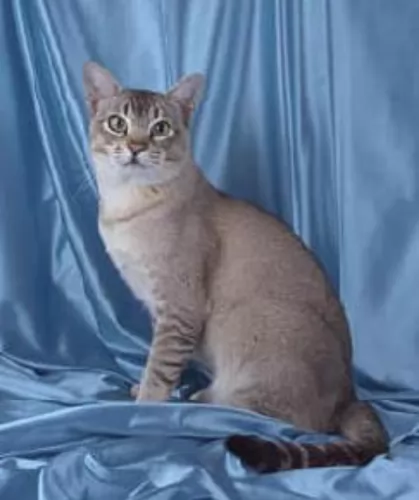 It is thought that the cat was brought to America by the Spanish to keep the rat population down.
It is thought that the cat was brought to America by the Spanish to keep the rat population down.
The name KEUDA stands for Kitten Evaluation Under Direct Assessment which is actually the name of a program that was running in Texas, Oklahoma and New Mexico and was for investigating the kinds of cats that survived as barn cats.
Today the Keuda isn’t registered and it’s not a well-known cat either, being looked upon as being similar to the Egyptian Mau breed as it shares some physical similarities with the Mau.
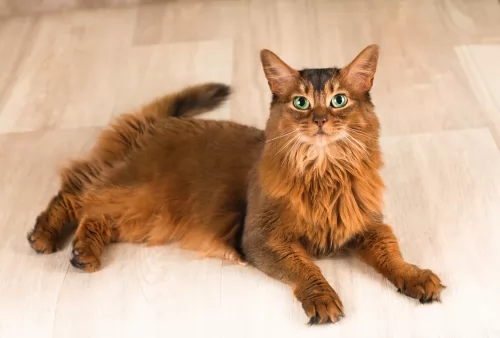 The Somali is a medium- to longhaired Abyssinian. It was in Britain that the original introduction of the longhaired gene took place.
The Somali is a medium- to longhaired Abyssinian. It was in Britain that the original introduction of the longhaired gene took place.
The first Somali cats came about in 1940 and it was British breeder Janet Robertson who exported some of her Abyssinian kittens to New Zealand, Australia and North America, Australia. Most of the kittens had long hair and breeders started showing an interest.
An American Abyssinian breeder Evelyn Mague decided to call her cats Somalis and the breed was recognized internationally by 1991.
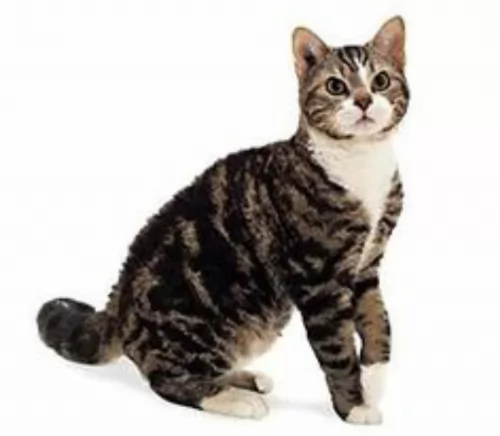 You can’t really pin-point what the American Keuda looks like as it looks a lot like the Maus but it can also look like a Siamese cat or even others.
You can’t really pin-point what the American Keuda looks like as it looks a lot like the Maus but it can also look like a Siamese cat or even others.
It is a medium-sized cat and can weigh up to 5 or 6kg while being very lithe and athletic. The head of the cat is medium-sized, the ears medium-large, the eyes almond-shaped, and the tail is slightly tapered.
An unusual aspect with this cat is its belly flap – loose skin that flaps at each elbow. The head is wedge-shaped, it has almond-shaped eyes, large ears and the fur is soft and silky and in a variety of patterns as well as solid colors. The coat is short to medium in length and there is no undercoat.
American Keudas are just your regular cat in personality - active, adaptable, inquisitive, and intelligent while being strong and agile.
They are also adaptable and social, getting along well with children as well as other pets in the home. It is also quite unusual in that it likes playing with water. They are also playful and love running, jumping and climbing and indoors it will want a climbing cat tree.
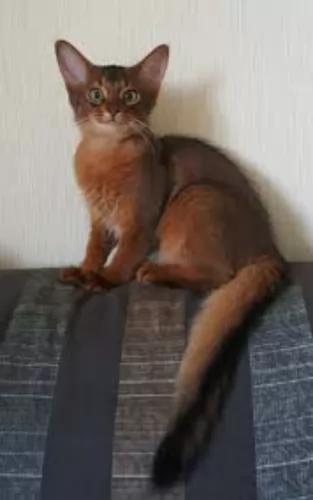 The beautiful Somali is a medium-sized cat which means he weighs in the region of 3 to 6kg. He is muscular and lean with the ears being set wide apart.
The beautiful Somali is a medium-sized cat which means he weighs in the region of 3 to 6kg. He is muscular and lean with the ears being set wide apart.
The ears are also tufted. The eyes of the Somali are almond-shaped and are usually a brown shade or green in color. The legs are long and the paws are also somewhat tufted. The tail is well plumed.
The Somali's coat is lovely and soft, while being thick and lustrous. The adult cats have a ruff. The Somali's coat comes in a range of colors but the most regular color is a beautiful brownish color with black ticking.
The Somali is an intelligent cat that relies heavily on its human owners for company as well as love and care.
They’re fun-loving cats that get on well with children in the home and from other pets. They are active cats and will need exercise. They should have some high perches and cat trees available so they can jump and climb.
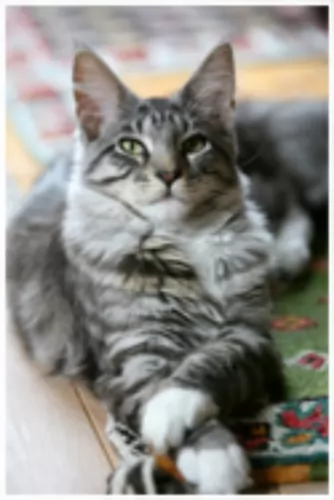 The beauty of American Keuda cats is that they are no-fuss cats and they are energetic, amicable, social, and playful and they make wonderful companions.
The beauty of American Keuda cats is that they are no-fuss cats and they are energetic, amicable, social, and playful and they make wonderful companions.
They are also fond of water and can even strike up a friendship with your dog. By bringing a Keuda into your home you can rely on a steady, loving friendship with your feline friend.
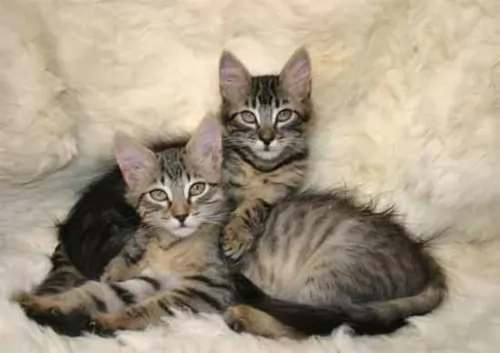 Thes cats enjoy good health and live to be 15 years of age or older even. You just have to watch out for him as they have no undercoats and it’s not a cat to do well in the cold.
Thes cats enjoy good health and live to be 15 years of age or older even. You just have to watch out for him as they have no undercoats and it’s not a cat to do well in the cold.
Whenever you buy a cat for the first time, try and find out about vaccines and previous conditions that might require special treatment.
Healthy kittens and cats are always alert and energetic with shiny coats and clear eyes.
Dental disease is quite common in cats, and it is always a good idea to have your pet’s teeth checked by your vet. Signs of pain with dental problems can include lethargy, pawing at the mouth, facial swelling, and reduced appetite. Get your cat immediately to the vet if you suspect problems with his teeth.
Neutering and spaying are imperative if you don’t want your pet to have kittens. It’s a simple operation for your pet and it comes with many health benefits for your cat. You don’t want your female cat having kittens as there are just already so many stray cats in shelters. Spaying and neutering mellows a cat too, makes them less prone to wandering, spraying, and fighting.
Make sure you have your American Keuda vaccinated against the many cat diseases that there are. Vaccinations are available against feline infectious enteritis or feline parvovirus, cat flu and feline leukemia virus, a disease that damages the cat’s immune system. Kittens require their first vaccine at around 8 weeks of age.
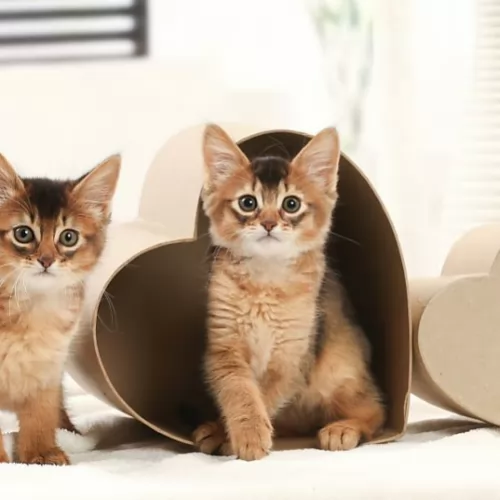 Although the Somali cat breed is healthy, as with many other cat breeds, there are a few hereditary diseases found in the Abyssinian that may be linked to this breed too. Look out for eye problems with the cat as well as anaemia.
Although the Somali cat breed is healthy, as with many other cat breeds, there are a few hereditary diseases found in the Abyssinian that may be linked to this breed too. Look out for eye problems with the cat as well as anaemia.
Progressive retinal atrophy (PRA) is a degenerative disorder of the retina. This eye disease can either be inherited or acquired.
When a cat gets sick there are some antibiotics that have been associated with progressive retinal atrophy in cats. Cats can also develop vision loss if their diet is deficient.
You have to be very aware of your cat’s diet and ensure that he is getting all the right ingredients, one of which is amino acid taurine. If you can see that your cat is battling to see, you should get him immediately to the vet.even though there is no treatment for PRA. . The vet will explain to you how to make life more comfortable for your pet.
Anemia isn’t a specific disease with your cat but rather the result of some other disease or condition. The most common sign that your cat has anemia is that you won’t find that normal pink color of the gums. Your cat will be listless and there may also be signs of blood loss such as blood in the feces or urine. Your vet will do several tests to diagnose the anemia.
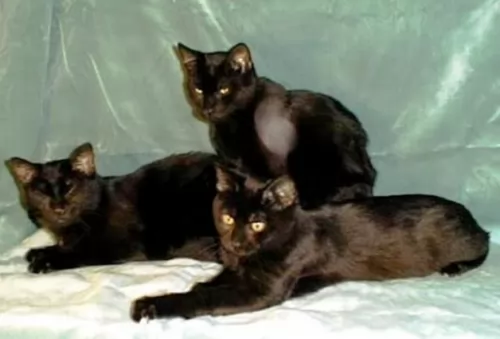 Every cat needs to be fed a complete, balanced high-in-protein food. There are heaps of different brands of cat food on the market - wet and dry. Always follow the manufacturer’s instructions and recommended amounts. If in any doubt about what to feed your cat, speak to your vet. Every cat needs a constant supply of fresh, cool water.
Every cat needs to be fed a complete, balanced high-in-protein food. There are heaps of different brands of cat food on the market - wet and dry. Always follow the manufacturer’s instructions and recommended amounts. If in any doubt about what to feed your cat, speak to your vet. Every cat needs a constant supply of fresh, cool water.
Both young and older cats love to play so ensure you provide your cat with stimulating toys as well as things such as climbing trees and a scratching post. Cats enjoy a high-up place where they can feel safe and view their surroundings from a height.
Cats spend many hours a day sleeping and you need to provide your cat with a warm, dry, comfortable, quiet place to rest. There are many cat beds available, but if you don’t have one, a cardboard box with one side removed and a soft cushion or blanket will do.
Invest in a litter box for your cat to do his business in and keep it in a safe, quiet place where your cat can ‘toilet’ in peace and quiet. These should be placed away from the food and water bowls. Make sure to keep a small plastic rake close by and rake up the cat droppings regularly to ensure the litter tray is nice and clean.
Your American Keuda is a short-haired cat but you want to brush the fur gently at least once a week. Grooming also provides you and your cat with some valuable bonding time.
Provide your cat with a collar to show everyone that he is yours. Also, have your cat microchipped – a tiny chip that carries your pet’s unique ID number and which is inserted safely and gently under the cat's skin.
Have your cat treated and free from parasites such as ticks, fleas, and worms. Speak to your vet about this.
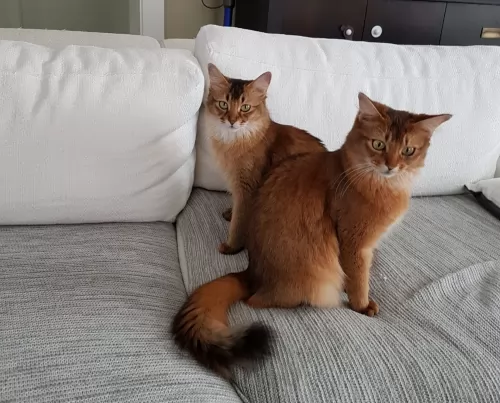 Cats can sometimes be finicky eaters and even the most delectable morsels might be ignored.
Cats can sometimes be finicky eaters and even the most delectable morsels might be ignored.
Every cat is unique but every cat is a carnivore – a meat eater – and requires a host of nutrients in their food to be healthy. Commercial cat foods aren’t all one and the same. You get different food for kittens, different foods for young adults, for pregnant cats, for energetic cats, and so on.
There is cat food for every season of a cat’s life. Other important considerations are feeding the right quantity of food to your cat.